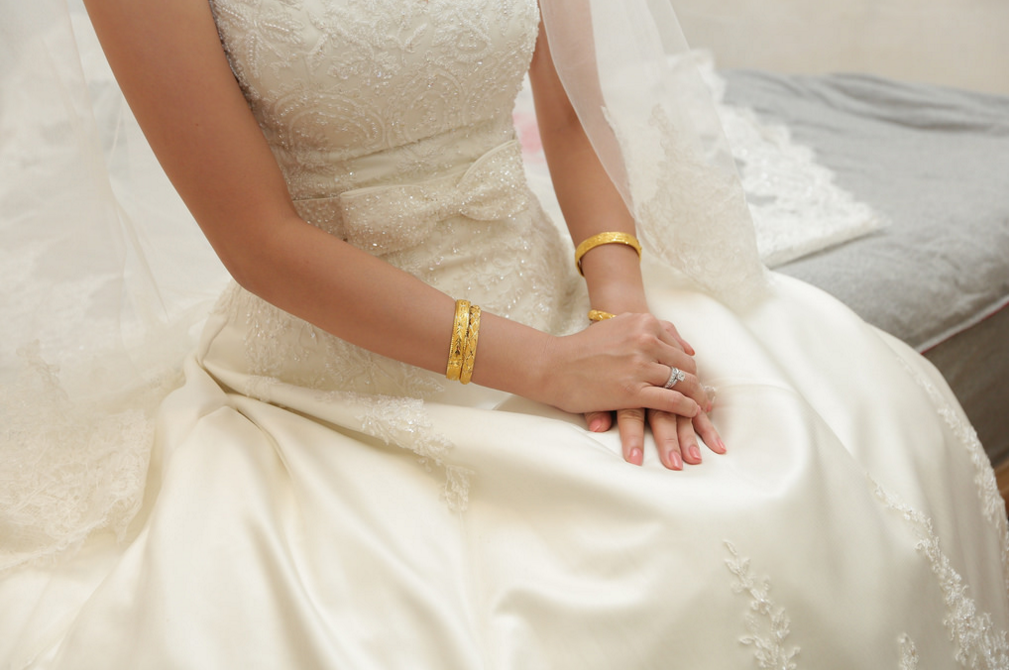The Feminist Dilemma Of Taking Your Husband's Last Name

By:
I've only been engaged for a month, but I learned almost immediately that a lot of people have a lot of opinions on weddings.
So far, my fiancé and I have been questioned because we don't want our ceremony in a church (we're not very religious, by the way), pushing our nuptials to spring 2017 rather than plan something this year, and significantly cutting down our guest list. Many people have also asked me whether I plan on keeping my maiden name, and some are surprised to hear that I intend to take my fiancé's last name after we tie the knot.
I consider myself a feminist, so a part of me worries that this makes me a bad feminist. I'm not alone. It turns out that many people feel this way. In fact, Mic writer E.J. Dickson experienced conflicted emotions of her own about getting engaged several months ago, as it felt odd "casting [her] vote for an institution that oppresses women."
RELATED: THE AGE YOU MARRY MATTERS MORE THAN YOU THINK
More women are keeping their last names.
Historically, many married women have been considered the property of their husbands, and women have almost always taken their husband's last name. But cultural opinions on marriage and last names are changing — and have been for years. Millennials are delaying and sometimes even forgoing marriage entirely, and more women are breaking away from the tradition of taking their husband's last name.
 Flickr/Chris Photography - flickr.com
Flickr/Chris Photography - flickr.com
Last year, The New York Times‘ Upshot Blog reported a rise in women keeping their maiden names. The Upshot conducted a Google Consumer Survey and found that nearly 20 percent of women kept their maiden name in recent years. The survey also found that higher income women in urban areas were more likely to keep their names. Women who are older and non-religious are also more likely to keep their last names, and the same goes for women with an advanced degree, children from a previous marriage, and an established career, according to The Upshot piece.
RELATED: HOW TO RESPOND TO SEXIST JOKES ABOUT WOMEN IN THE KITCHEN
None of this surprises me. Many women I know and respect have written about why they maintained their maiden name after marriage. I understand why they do it. Since I started regularly publishing stories in 2008, I've worked tirelessly to cement a presence for myself as a writer on the internet, and I can't imagine rebranding myself with a new name after all of these years. So even though my byline will stay the same, I want to have my fiancé's legal last name. Why? For one, I adore his last name, even though I didn't grow up with a super complicated or long name that many women can't wait to get rid of when they get married. Most of all, I'd like to share a last name with the person I love most in this world. It's a choice I want to make for our future family.
While this works for me, I also fear that I'm part of the problem for going against the contemporary move of keeping one's maiden name. Will our progressive future kids wag their fingers at me for not "getting with the times"? Could this pose confusion in my personal and professional life? Will people I care about think less of me for privately giving up my birth name after fighting tooth and nail to establish a writing presence online?
Ultimately, it's up to me. Just as it is to all women and men who marry.
The Amal Clooney controversy.
I'm not crazy to fear a backlash. Amal Clooney received flak for taking her actor husband's last name in fall 2014, with many arguing that it was regressive of an accomplished attorney and career woman like herself to do this. News outlets reported on her decision after her work profile name changed online, prompting some to spew outrage on social media.
RELATED: The Scary Financial Reality of Your Wedding
 Doughty Street - co.uk
Doughty Street - co.uk
"The barrister formerly known as Amal Alamuddin has renounced her feminist credentials by assuming her actor husband’s surname, both personally and professionally," LegalCheek writer Natalia Naish wrote at the time. "[S]he is doing the world a disservice by demonstrating that even very powerful and successful women are still less important than the men they marry — even when, as in the case of Amal, this is obviously not true."
Does taking your husband's last name mean you're a "bad feminist"?
Adriana Wilson, a 29-year-old writer, told ATTN: that taking her husband's last name went against her cultural upbringing and made her feel like a "bad feminist" at first.
"Where I come from, women don't take their husband's last name," Wilson told ATTN:. "The closest Puerto Rican women get to taking their husband's name is to adding it to their existing last name joined by 'de' which literally means a woman a certain man's. When my now husband and I were discussing getting married, he told me he didn't care if I took his last name or not. Even thinking about taking his last name felt like a betrayal to not just my cultural upbringing, but also to the staunch sexism I had battled against throughout my life."
RELATED: Here's What Happens When Your Tinder Profile Says You're a Feminist
Though she said she would have laughed at the prospect of taking anyone's last name prior to meeting her husband, she ultimately decided to take his last name for the sake of their future family.
"My decision, however mine I thought it was, sparked controversy within my traditional Puerto Rican family," she continued. "My father even pulled me aside and asked me if I didn't think it was a sexist American tradition."
The power of being able to choose which name you want.
Though Wilson initially felt like a "bad feminist for a while," she ultimately concluded that there's nothing negative about making her own choices.
"The very act of having agency over my life, over picking my own supportive partner, over what last name I choose, over which jobs I agree to, over which salary I'm entitled, and over how guilty I get to feel over a decision that is only mine to make is a very good definition of what feminism means to me," she said.
